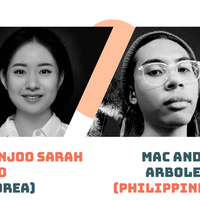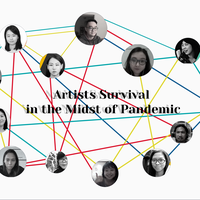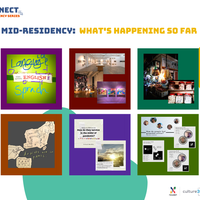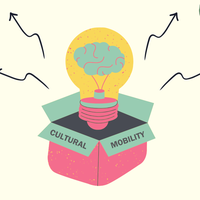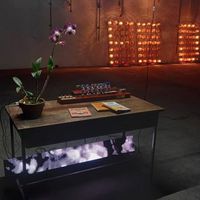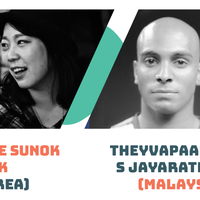Virtual360 Konnect | Art Residencies in the Pandemic Era
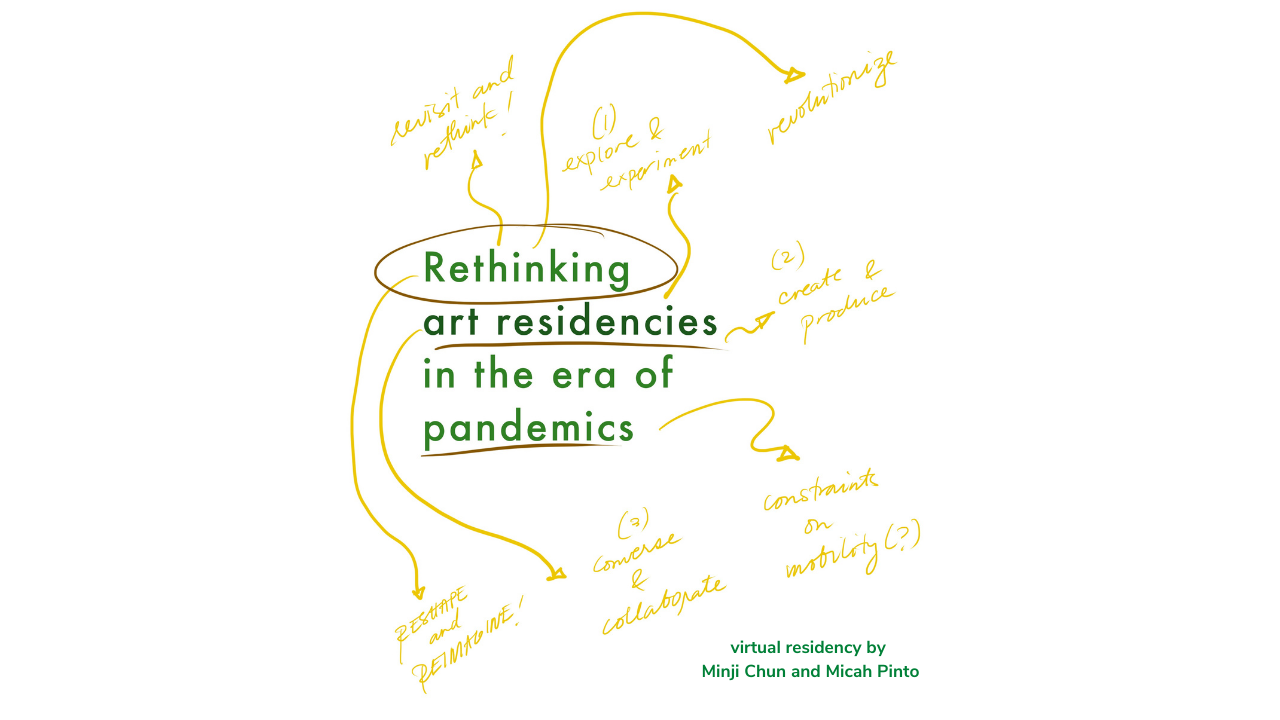
Through their reflexive participation in the Virtual360 Konnect – Emerging Arts Leaders Residency Series, Minji Chun from Korea & Micah Pinto from the Philippines investigate how the current global conditions and the changing creative landscapes affect, and continuously reshape our experiences of exploration, collaboration & production.
Several months into the lockdowns caused by the COVID-19 pandemic, global communities have been forced to rethink and recalibrate current systems. And while constraints on mobility have been affecting artmaking and artistic collaboration, we began to ask questions that led to a web of inquiry: how will residency programs be experienced in new environments we create physically and digitally? How will artistic activities and creative experiences be realised online and offline? How can real collaborations be cultivated?
It was September when we started to work on submitting a proposal together, almost a year since the first time we met in a fellowship program in Austria. Minji Chun was working on translating residency programs that were made available to Korean artists and practitioners. On the other hand, Micah Pinto has been working on revamping organisational projects (including a residency program) amidst continued lockdowns in the Philippines. We both were constantly working on residencies in terms of program development and management, but both of us has never participated in one.
Being part of the Virtual360 Konnect, a virtual residency program engaging art practitioners from Korea and the ASEAN region, gave us time and space to interrogate, research and even experience the shifts we perceive. We revisited the core of residency programs, researched on residencies that were still being rolled out amidst the pandemic, and interviewed co-residents in Virtual360 Konnect, as we continue to navigate through the transitions within the cultural sector.
Initially, we identified the essence of residency programs, and categorized them into: (1) exploration & experimentation, (2) creation & production, and (3) conversation & collaboration. We then moved deeper into our research by doing a survey of current residencies, and how they continue to realise the essence of residency programs amidst the global pandemic.
2020 International Art Residencies
Aside from long-withstanding residencies such as the Camargo Core Program in France, we looked into residencies that opened calls for applications as the creative sector moves toward the “new normal.”
One of the active programs this year is from the Sapporo Tenjinyama Art Studio 2020, which is a program for international artists in the field of visual art. The studio started the project: “Move < Stay” to “Move > Stay.” The program raises the following questions: “What do we have now and what can we use? Can the movement of imagination, technology, and spirit be an alternative to the physical movement of artists? Is it possible to manage AIR without actually moving? What does moving mean anyway? What is waiting after having moved?” The residency program is divided into two phases, where the first part would have participants move to the studio located in Sapporo without taking any flights for 60 days. After the period of movement, the studio provides 40 days of residency work as a second phase. The project investigates the core concept of “movement” of artists.
Another example is After Social Networks’ MEDIA HOMES Online Artist Residency This project, which lasts two consecutive weeks, turns the institution's Instagram platform into a curatorial platform exhibiting artistic results by the participants. As the theme "Media Homes" shows, the residency aims to experiment with new art practices “at home” based on the media ecosystem connecting the world.
Coming back to Virtual360 Konnect, it is the first virtual residency series of its kind to be launched by the Asia-Europe Foundation in partnership with the ASEAN Foundation. Aside from this, ASEF partnered with Japan Foundation - Bangkok to launch another e-residency program, Virtual Workings; which is to foster collaboration between emerging arts curators based in ASEAN and Japan. Different from the Virtual360 Konnect, the participants of Virtual Workings residency are facilitated and guided by mentors. However, both take on a fully virtual residency format.
Overall, these case studies show how the world of restricted mobility is gradually transforming to still cultivate artistic collaborations across different regions. But as we continued with our research, we thought it would be more engaging and productive to consult with our co-residents in Virtual360 Konnect. The set of interviews allowed us to process the virtual residency experience concurrently with our fellows.
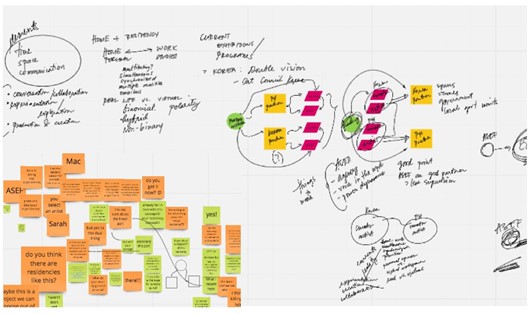
A meeting using a visualisation tool, Miro
The Virtual360 Konnect Experience
As most of the participating residents are emerging practitioners, we shared very similar goals of cultural exchange, networking, and collaboration. Most of us wanted to know about the creative processes of our contemporaries in the field, and how other cultural practitioners are doing now during this extraordinary time. Residents found a space in the program to collect and process thoughts & experiences of the pandemic together. Others found new ways of connecting and working through the virtual residency--- discovering platforms like Instagram, Zoom, Miro and other visualisation tools to help in creative collaboration.
We realised the importance of time, space, communication, intimacy and familiarity as critical elements of both residencies and collaborations. While others applied independently to the program, others also applied as a pair to work on a project. Because pairs were at different levels of familiarity, this too had an effect on how the month-long residency was managed.
Being in different time zones also made it difficult to find shared time and shared experiences. While different contexts can make the collaboration interesting and meaningful, not being in shared space also made the exchanges quite challenging. Some residents discovered the Zoom fatigue to be a real phenomenon. And even the accessibility to the internet has been limiting our access to communication cues that allow conversations to flourish in a more natural way.
While there were challenges in the virtual space, the experience allowed us to explore new methods and strategies to continue collaborative creative work without having to travel physically. We focused on narrative exchanges and research to foster and deepen relationships with our peers. Not having a mentor for the program allowed us to make the residency our playground as we navigate through different possibilities to communicate and reach out to others. It stretched our understanding of shared time and space, especially in this era of physical distancing. Most importantly, it gave us an opportunity to be reflexive of our own practices as we move forward with program development and innovation.

A series of interviews on virtual residency experience with Virtual360 Konnect fellows
Residencies as nurturing spaces
As we continue to rethink systems and practices in the creative sector, we reflect on the essence of residency programs being for artistic development: exploration & experimentation, creation & production, conversation & collaboration.
While we cannot deny how pandemics and crises have been reshaping our world, what if we try to operate with a new language? Perhaps, the essence of residencies begins with acknowledging the value of care work--- building homes & sustainable ecosystems for creativity to flourish.
References & Links for Further Reading
https://news.artnet.com/art-world/art-demystified-artist-residencies-649592
https://tenjinyamastudio.jp/open-call-2020.html
http://after-social-networks.com/
https://www.camargofoundation.org
http://www.fondation-janmichalski.com/en/residence-pour-ecrivains/
https://www.bbc.com/worklife/article/20200421-why-zoom-video-chats-are-so-exhausting
This article is part of a series of articles written by the participants of Virtual360 Konnect - Emerging Arts Leaders Virtual Residency Series, an online cultural exchange and capacity building initiative developed by the Asia-Europe Foundation (ASEF) and the ASEAN Foundation through KONNECT ASEAN. Over a period of one month, 20 emerging art leaders from Korea and 5 countries of the ASEAN region (Brunei Darussalam, Indonesia, Malaysia, Myanmar, Philippines and Singapore) collaborated in pairs on the theme of international cultural exchange in the Covid-19 era.
Similar content
18 Oct 2020

